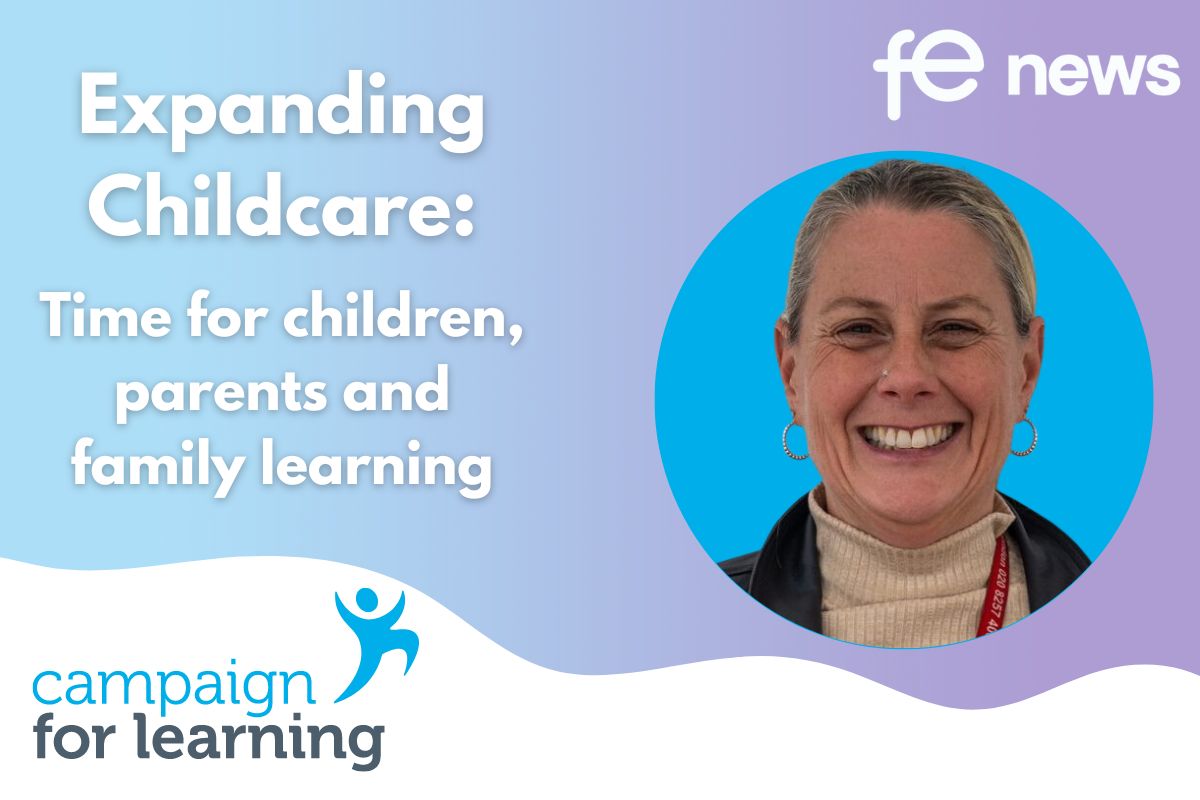The new childcare entitlements and access to further education

Expanding Childcare: Time for children, parents and family learning
The recent Spring Budget announcements included extending free childcare to support more parents returning to work after parental leave ends, which is a much-needed change to current funding. The increase in funded childcare places will be phased in from now until September 2025 meaning that by September 2025, working parents of children under the age of five will be entitled to 30 hours free childcare per week.
Challenges and barriers for parents not in work
However, many parents are not returning to work – they are starting out on their journey into work, are new entrants that have gained the right to work or have had a career break and decide to study instead to gain the necessary qualifications and skills they need to enter the workforce. There has been a plethora of courses aimed at upskilling adults including Multiply and sector-based work academies (SWAPS).
So if childcare is one of the biggest costs facing working households how does this impact those families where one or more parents are not in work, or finds themselves needing to retrain and upskill. How do they access further education and afford childcare whilst gaining the skills and qualifications to even start the journey into securing sustainable employment?
The challenge of finding childcare that is affordable, flexible and convenient is in itself another hurdle to overcome. Courses are generally delivered during term time, yet finding a childcare place that accommodates this pattern can be problematic and often leaves the learner having to find the cost of the childcare for the holiday weeks.
Current funding in FE for childcare costs
Any provider with an Adult Education Budget (AEB) contract will be able to support learners aged 20 or older through the Learner Support fund with the cost of childcare – however, the allocation of this is left to each individual college or training provider and can therefore alter considerably from one provider to another.
Learners aged 16 to 20 can access a different scheme called Care to Learn, which is administered by the Government and provides a capped amount for eligible applicants.
The process for allocating Learner Support funds is administered by college staff using in house systems, and at a time when funding for further education is lagging behind inflation, staff resources are often inadequate and unable to distribute funding adequately.
How much a learner is allocated, how it is linked to attendance, and the number of hours that are funded are all factors that are used when decisions are made by each individual provider.
This can often be confusing and the application process lengthy and complicated – learners are expected to provide additional information regarding their level of income, childcare contracts, and receipts. Colleges and training providers will then have to confirm that the childcare provider is Ofsted registered and calculate how much funding the learner will be given. This often involves trying to work out if the learner is already accessing their entitlement for funded childcare and ascertaining if additional costs are related to the hours they are studying.
Learners can often be left unsure of how much they will receive. Learner Support Funds are only paid for the time in college and therefore does not cover holiday weeks, travel or study time and are often paid in arrears meaning learners are faced with finding money they do not have, opting for cheaper childcare providers and struggling to balance childcare with studying.
How are nurseries, childminders and childcare providers being supported?
The Government’s proposal includes increasing the hourly rate to childcare providers, increasing the number of children a staff member can look after at the same time and, for those parents on Universal Credit, being able to access funds upfront.
Impact on the childcare workforce
This proposal would also suggest that more qualified childcare professionals will be needed by September 2025 – therefore, we expect to see an increase in the uptake of childcare courses and in turn more applications for support with childcare costs whilst they study, due to many parents seeing a career in childcare as one that aligns itself to working whilst looking after their own children. The impact on providers to process and approve these claims for financial support and release funds will increase and may become another barrier to learners wishing to enter further education.
Recommendation 1
The Government should introduce a national campaign to raise awareness of the funding available to parents for childcare costs when they decide to return to further education.
Recommendation 2
DfE should introduce a standardised approach to allocating and distributing childcare funding from providers’ AEB allocations to ensure learners are clear about their entitlement and can secure places with childcare providers in a time to start their courses.
Recommendation 3
The Government should introduce a system where parents wanting to study can apply for childcare funding in the same way as those entering the workforce to ensure consistency in funding and entitlement.
By Sharon Cousins, Vice Principal, Newham College and Executive, National Association for Managers of Student
Campaign for Learning has released a new series of articles, Expanding Childcare: Time for children, parents and family learning.
See below when each article will be published on FE News:
Part One: Childcare the welfare state – 20th July
1. Will Snell, Chief Executive, The Fairness Foundation
Childcare and a new social contract
2. Anneka Dawson, Head of Pre-16 Education, Ceri Williams, Senior Research Fellow, and Alexandra Nancarrow, Research Fellow, Institute for Employment Studies
The childcare sector: Providers and the workforce in England
Part Two: Childcare and time for work – 21st July
3. Paul Bivand, Independent Policy Analyst
Women, employment and childcare
4. James Cockett, Labour Market Economist and Claire McCartney, Policy Adviser, Resourcing and Inclusion, CIPD
The planned childcare entitlements and progression into work
5. Jane van Zyl, Chief Executive, Working Families
Combining flexible working and childcare to solve the childcare crisis
Part Three: Childcare and time for child development – 24th July
6. Janeen Hayat, Director of Collective Action, Fair Education Alliance
Improving childcare quality to support educational outcomes
7. Megan Jarvie, Head of Coram Family and Childcare
Making a step change to child development through childcare
8. Professor Elizabeth Rapa and Professor Louise Dalton, University of Oxford
Childcare, children’s development and education outcomes
Part Four: Childcare and time for parental engagement – 25th July
9. Lee Elliot Major, Professor of Social Mobility, University of Exeter
The childcare revolution: A new opportunity for parental partnerships in child learning
10. Bea Stevenson, Head of Education, Family Links the Centre for Emotional Health
Childcare and parental engagement in child learning
Part Five: Childcare and time for adult skills – 26th July
11. Simon Ashworth, Policy Director, AELP
The new childcare entitlements and skills bootcamps
12. Sharon Cousins, Vice Principal, Newham College and National Association for Managers of Student Services Executive
The new childcare entitlements and access to further education
13. Susan Pember, Policy Director, HOLEX
A thriving society means linking the new childcare entitlements to adult learning
Part Six: Childcare and time for family learning –
27th July
14. Sam Freedman, Senior Fellow, Institute for Government
The childcare revolution and family learning
15. Susan Doherty, Development Officer – Family Learning, Education Scotland
Family learning and childcare: Lessons from Scotland
28th July
16. Susannah Chambers, Independent Consultant
Bringing childcare and family learning together
17. Henriett Toth, Parent
Family learning and childcare: A personal experience











Responses